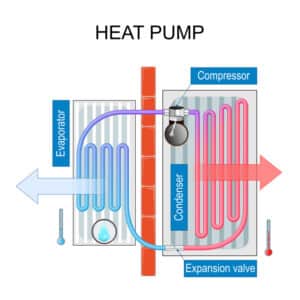Gas Heat vs Reverse Cycle – Gas vs Electric Heat Review
The most important thing about your choice of gas heating vs electric heat is the comfortable warmth it delivers.
So, do you choose Reverse Cycle Heating (heat pump) or Gas Heat?
The Comfort Factor – Gas vs Electric Heat
Comfort plays a key role in gas vs electric heat and how satisfied you will be with your new heater.
When you sit near your heater, you want to feel warm, not cold.
Almost everyone agrees that gas heat feels more comfortable but new research now confirms the “Why?”
The Research on Gas vs Electric Heat
In its most recent comparative analysis of residential heating systems, research firm Newport Partners used sophisticated building modelling software to answer the question with real data.
“You hear a lot of buzz about heat pumps being uncomfortable in the winter season, especially when outdoor temperatures are cold,” says Mike Moore, a consulting engineer with Newport.
“We wanted to find a way to try and quantify it.”*
What Makes for Comfortable Heat?
 Comfort is a very subjective measure, so quantifying it is difficult.
Comfort is a very subjective measure, so quantifying it is difficult.
With convection gas heaters, the temperature of heated air being delivered can have both a positive psychological and physical effect on occupant comfort.
“If the air temperature being supplied is below your skin temperature, then you are going to have the perception of being cooled, especially when there is a flow of air across your body,” Moore says.
So for the study, Newport assumed that when supply air temperatures are at or below typical body temperature — around 37°C — many people feel cool and uncomfortable.
In other words, if the air flow temperature being supplied is at or below your skin temperature, then you are going to have the perception of being cooled when you really want to be warmed.
How Was it Measured
Newport’s next step was to quantify how often different heating systems would deliver that cooler, uncomfortable air flow.
Moore used two building energy simulation tools supported by the US Department of Energy (DOE) to find out.
In both mixed and cold climates, the air flow from the reverse cycle heaters feels cool about 60 percent of the time during the heating season.
Convection gas heaters, in contrast, provide an air flow consistently above the comfort threshold of 46°C.
The Problem with Heat Pumps

There is a difference in air flow temperature supplied by the two types of heaters.
This is caused by the different ways the two systems generate heat.
Heat pumps draw heat from the outdoor air.
As outdoor temperatures fall, there is less heat available to transfer to the indoor unit, so the air flow temperature falls.
Some heat pumps will eventually turn to electric resistance heating to raise the temperature.
But before this booster heat comes on, the air flow temperature remains cool and uncomfortable.
And when the booster is active, electric resistance heat uses much more power and is the most costly way to heat your home.
The Advantages of Gas vs Electric Heat

Gas heaters operate independently from outdoor conditions.
A convection gas heater is simply heating the indoor air with gas combustion.
It supplies a steady, consistent air flow temperature above the comfort threshold, regardless of outdoor temperatures.
Gas heaters also have the advantage of heating up a cold house faster.
If you come home or wake up to a cold home, you want to get warm as quickly as you can.
Gas heaters do a much better job of supplying heat rapidly in both flued and portable gas heaters.
The same is true for both LPG and natural gas heaters for sale.
Virtually all gas heaters are available in both LPG and natural gas versions.
Rinnai, Paloma, Everdure and Braemar all make gas heater models for use with both gases.
Price Comparison of Gas vs Electric Heat
Gas heaters are typically less expensive to purchase and easier to install, especially if you already have gas at your home.
With less moving parts and no refrigerant re-gassing issues, the cost of maintaining gas heaters should also be less.
Gas heaters typically have a much longer life span, too.
Both types of heaters are energy efficient, especially compared to conventional electric heaters.
For example, many gas heaters are rated at 5.8 or 5.9 Stars out of a maximum possible 6 Star rating.
Gas vs Electric Heat – Which do I Choose?
So, in the gas vs electric heat debate, is gas heat really more comfortable than reverse cycle heat pumps systems?
The research says it’s true.
People feel warmer when the air flow produced by their heater is well above body temperature.
Gas heaters do this 100% of the time while the research shows that heat pumps only achieve this 40% of the time.
What Size Gas Heater Do I Need?
What to Consider
Heating Area Volume & Climate Zone
Very Cold Zone: 1kW output required for each 8.5m²
Adjustment Factors
Gas Heater Sizing Example #1:
Gas Heater Sizing Example #2:
Use kW not MJ



